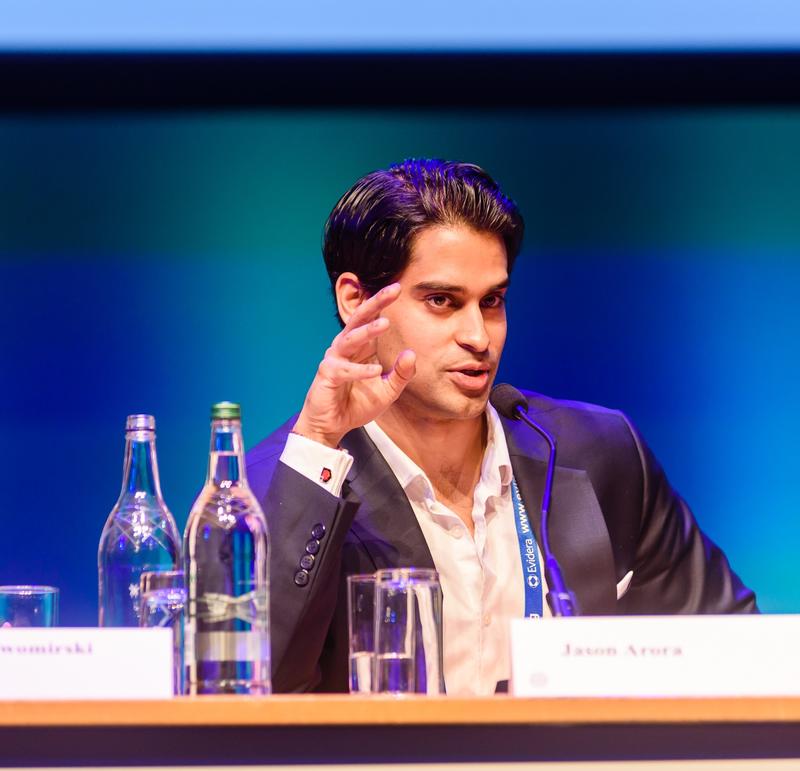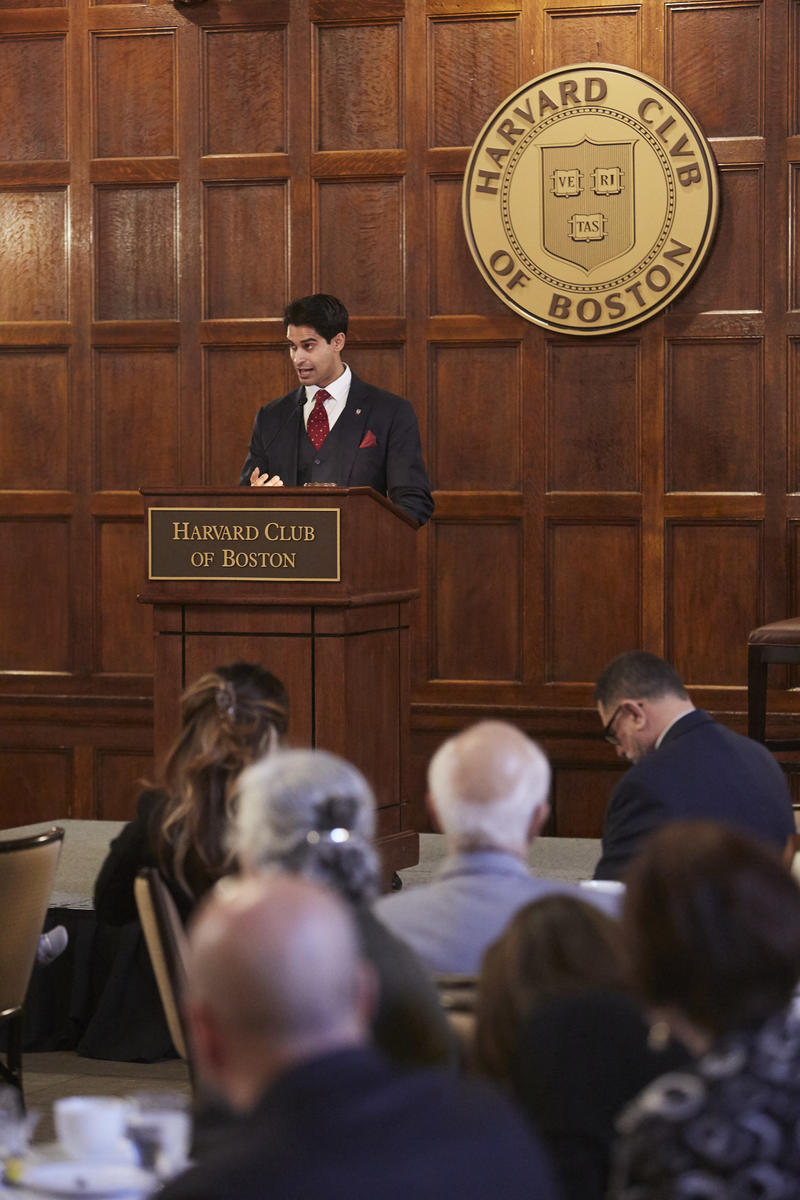ALUMNI STORIES: 'WE NEED TO CHANGE OUR HEALTHCARE SYSTEMS TO IMPROVE OUTCOMES'

Credit: Harvard TH Chan School of Public Health
ALUMNI STORIES: 'WE NEED TO CHANGE OUR HEALTHCARE SYSTEMS TO IMPROVE OUTCOMES'
Jason Arora (St John's, 2005) on studying medicine at Oxford, and working for a new system for value-based healthcare
Published: 15 November 2018
Author: Tabitha Whiting
Share this article
We spoke to alumnus Jason Arora about his time studying medicine at Oxford, and his subsequent career working with start-ups, governments, hospitals, universities and more on a new system for value-based healthcare.
What was your experience of studying Medicine at Oxford University?
In a word: transformative. I will probably always look back at it as the period that will have the biggest lasting impact on my life. The transition from a state school environment to Oxford was a very positive experience. It opened my eyes and broadened my horizons in countless ways. Oxford is incredibly diverse and international, with people from all sorts of backgrounds. There really is something for everyone if you’re willing to get out there and explore. The best way to build your confidence through your formative years, when everything is already so visceral, is to rack up lots of enriching experiences. Oxford was perfect for that.
Studying medicine – a subject matter that deals in existential realities as much as it does deep science – was a real privilege. It matures you at a relatively young age and encourages you to see the world from many different perspectives. That said, the degree didn’t come easily! You really have to graft hard – lectures, labs, tutorials, clinical shadowing, self-study, and countless exams. The only way to survive is to play hard too! Plus, spending 6 years in a beautiful city like Oxford is no bad thing!
Did you have a favourite place to study in Oxford?
The Said Business School Upper Library, for a couple of reasons. First, I’ve always studied better on my own, so the Said Business School was great for me because no one there really knew who I was. It was a nice way to get out of the pressure cooker and find a quiet space to get into your zone. During revision breaks, you could bond with others and experience a pure version of camaraderie, simply because you were studying for different exams. That said, others study better in groups and can become more anxious studying away from others doing the same subject, so it really does come down to personal preference. The key is to understand how you study best. Second, because the library was beautiful – comfortable seats, huge desks, lots of light, strict silence, and amazing lunches!
In one sentence: what does Oxford mean to you?
My second home.

Credit: ISPOR (International Society for Pharmacoeconomics and Outcomes Research)
Now onto life after Oxford. Can you tell us about your career so far?
After graduating went on to practice as a doctor in the UK, which I did for two years.
In 2013 I was awarded a scholarship to travel to the Harvard Chan School to study for a Masters in Public Health. This focused on global public health, and allowed me to explore different vehicles for achieving patient-centred, sustainable healthcare. I also interned at a couple of medtech startups to get a better sense of how innovative new technologies play a role in driving sustainability in healthcare.
In 2014 I then joined the International Consortium for Health Outcomes Measurement (ICHOM), a global non-profit start-up which is focused on value-based healthcare, aiming to inspire the entire healthcare industry to transition to value based healthcare, and to facilitate this change. I worked with the ICHOM until 2017, helping to develop them from a small start-up to a highly influential global player in the industry.
In 2017 I joined the medical technology company Medtronic as director of value-based care, overseeing work in this area across Latin America and focusing on the use of technology to drive sustainability, quality, and access in health systems. I also serve as a global health expert at the World Economic Forum and as a global leader at the Center for Health Care Innovation.
What were the best and worst things about working for a start-up?
Resources are always limited, so you are literally fighting for survival on a daily basis! ICHOM is a non-profit, so this is even more so the case. A neutral organisation that is essentially trying to ‘create’ a field, continuously prove concepts, and lay out the path for itself and others around it, is challenging. It can create a perfect storm of strategic, operational, and political factors that need to be managed proactively.
On the flipside, growing a startup is incredibly exciting. As long as you have the strategic, operational, and financial discipline, you can be as nimble and creative as you like. It gives you the chance to develop many skills that you won’t already have, and exposes you to the many aspects of growing and running a business.
What made you decide to stop being a practicing doctor in the UK, and look instead at global healthcare systems?
As a practicing doctor on the front line, I felt like a very blunt instrument spending most of my time ‘fire-fighting’. Once I was done seeing to a patient I knew there was a good chance they’d end up back in the system despite my best efforts. Often, the system just couldn’t do enough, and I wanted to understand why - good health is a fundamental enabler of human progress, so why are we so bad at healthcare?
Further, as a student, I had done some clinical work in India, Timor, Samoa, and South Africa, and had developed an interest in global health. I had noted that the same chronic diseases that are plaguing the NHS are on the rise everywhere. I remember returning home from a long shift one day, and thinking: if we are struggling to deal with this rise in chronic diseases in advanced health systems like those in Europe and the US then how is the rest of the world - around 75% of the human population - going to cope?
Most of your work now focuses on value-based healthcare. Can you tell us a bit about that: why is it a better system of healthcare?
With a global rise in chronic diseases, we are spending more and more on healthcare. A few decades ago patients would come into hospital and either be cured quickly or sadly, pass away, and that is what many of our health systems were built for. Now people live with diseases that require continuous intervention from the health system for many years, and in the community as well as the hospital. This costs a lot of money, which is why the NHS, for example, is always short of resources. It just isn’t sustainable, because needs are going to continue to increase without a concomitant increase in available resources. To make matters worse, increased healthcare spending is not translating into better patient outcomes. Therefore, we need a different approach.
Value-based health care (VBHC) focuses on delivering the best possible patient outcomes at the lowest possible cost, using high-quality data to reshape health systems around this basic principle. There is a lot of waste in healthcare (in the US, it is estimated that around 1/3 of resources put into health go to waste), and so there are definitely low-hanging fruit that we can target to direct available resources to the right places. Lean health systems, running on value data, will help us deliver healthcare at high quality with limited resources.
There is now global acknowledgement that we need to shift to VBHC. However, we are still in the early stages of actually making this happen. I’ve worked with governments, hospitals, universities, tech companies, pharma companies, and others, to build value-based programs based on the principles above, with the aim of delivering better patient outcomes and lower cost, and therefore getting more patients access to health care.
Really interesting, thank you. Do you think that studying at Oxford had an impact on your career path?
The biggest influence probably came from my frequent interactions with non-medics. Oxford’s collegiate system provides a huge advantage because it actively mixes students within different subject areas. They live together, eat together, and party together. It broadens horizons, facilitates wisdom, and encourages compassion.
And finally, do you have any advice for a prospective student thinking of applying to Oxford to study medicine?
Being a junior doctor gets a lot of bad press these days. That doesn’t mean it isn’t worth doing. For those who aren’t sure, I would highly recommend doing the medical degree regardless if it is your subject of interest. It is a fantastic immersion opportunity that provides a unique and wholesome package of personal and professional development at a relatively young age. And even if you don’t want to practice medicine at the end, there are countless opportunities both inside and outside the healthcare space for which a medical degree is a huge asset. You can even change your mind after getting your BA in medical sciences three years in, so you really have nothing to lose. Even though medicine is a vocational degree, I would treat it as any other degree. Study what you are interested in, and figure out your career later. Your time at university should be spent going deep on your subject of interest and expanding your horizons, both personally and professionally. During that time and beyond, you should continuously shape your understanding of the world and decide what positive impact you want to have on it. What change do you want to see? What is going to advance us, as a civilisation and society? That's where your career comes in.
Jason is the recipient of Harvard’s 2018 Public Health Innovator Award, and was named on Forbes’ '30 under 30 Health Care and Science' list in 2017 and on KPMG’s 'Top 100 Asians in Tech' list in 2018. Jason holds degrees in medicine and medical sciences from Oxford, and public health from Harvard, and is a former Fulbright Scholar.
You can find out more about Jason's work on on value-based healthcare systems in his articles for Medtronic: International Efforts to Find Common Ground and Using Data and Partnerships to Quash 'value vacuums'. You can also connect with him on LinkedIn to find out more.















